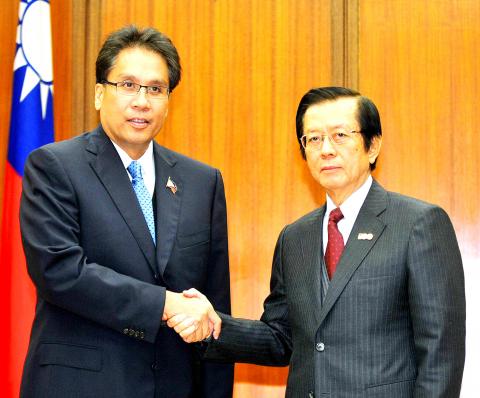A special envoy from the Philippines yesterday met Foreign Minister Timothy Yang (楊進添), but did not offer an apology for the recent diplomatic fracas between Manila and Taipei, describing it as a “misunderstanding.”
“I bring with me my president’s good wishes for you, President Ma [Ying-jeou (馬英九)] and the Taiwanese people, and his sincere and deep desire to mend whatever misunderstandings and difficulties this recent unfortunate event might have caused in our otherwise good relationship,” said Senator Manuel Roxas, who was dispatched by Manila to mend fences with Taipei after the Philippines deported 14 Taiwanese fraud suspects to China on Feb. 2 despite strong protests by Taiwanese officials.
Without offering the apology repeatedly demanded by Taiwan, Roxas said he came to Taiwan under the directive of Philippine President Benigno Aquino III to take care of this “very, very important matter.”

Photo: AFP
Yang welcomed Roxas, but did not respond to Roxas’ comments when he called Taiwan his -country’s “closest neighbor” as they shook hands.
Only the first three minutes of the meeting were open to the press and the two men continued their discussion behind closed doors once reporters were removed.
The friendship between Taiwan and the Philippines is being tested over the matter.
Manila’s decision to ignore Taipei’s demand prompted Taipei to implement a string of retaliatory measures against the Philippines, including tightening the screening of applications by Philippine citizens seeking to work in Taiwan, as well as the cancelation of visa-waiver privileges for certain categories of Filipinos.
Manila defended its decision by saying the 14 men did not have proof of citizenship at the time of their arrest and that the move was in the best interests of the Philippines.
Taiwan and the Philippines do not have diplomatic relations and Manila adheres to a “one China” policy.
Ahead of Roxas’ visit, Taipei said the relaxation of its retaliatory measures against Manila would be contingent on the message brought by the special envoy.
Asked yesterday about the likelihood of Manila apologizing for the deportations, Philippine presidential spokesman Edwin Lacierda said it would not happen.
“We believe in the process that we undertook,” he said, speaking on Philippine government radio about the deportation.
According to the authorities, the 14 Taiwanese fraud suspects were allegedly part of a crime ring that preyed on Chinese nationals living in China. It is said the syndicate swindled their victims out of NT$600 million (US$20.44 million).
ADDITIONAL REPORTING BY AFP

Right-wing political scientist Laura Fernandez on Sunday won Costa Rica’s presidential election by a landslide, after promising to crack down on rising violence linked to the cocaine trade. Fernandez’s nearest rival, economist Alvaro Ramos, conceded defeat as results showed the ruling party far exceeding the threshold of 40 percent needed to avoid a runoff. With 94 percent of polling stations counted, the political heir of outgoing Costa Rican President Rodrigo Chaves had captured 48.3 percent of the vote compared with Ramos’ 33.4 percent, the Supreme Electoral Tribunal said. As soon as the first results were announced, members of Fernandez’s Sovereign People’s Party

MORE RESPONSIBILITY: Draftees would be expected to fight alongside professional soldiers, likely requiring the transformation of some training brigades into combat units The armed forces are to start incorporating new conscripts into combined arms brigades this year to enhance combat readiness, the Executive Yuan’s latest policy report said. The new policy would affect Taiwanese men entering the military for their compulsory service, which was extended to one year under reforms by then-president Tsai Ing-wen (蔡英文) in 2022. The conscripts would be trained to operate machine guns, uncrewed aerial vehicles, anti-tank guided missile launchers and Stinger air defense systems, the report said, adding that the basic training would be lengthened to eight weeks. After basic training, conscripts would be sorted into infantry battalions that would take

GROWING AMBITIONS: The scale and tempo of the operations show that the Strait has become the core theater for China to expand its security interests, the report said Chinese military aircraft incursions around Taiwan have surged nearly 15-fold over the past five years, according to a report released yesterday by the Democratic Progressive Party’s (DPP) Department of China Affairs. Sorties in the Taiwan Strait were previously irregular, totaling 380 in 2020, but have since evolved into routine operations, the report showed. “This demonstrates that the Taiwan Strait has become both the starting point and testing ground for Beijing’s expansionist ambitions,” it said. Driven by military expansionism, China is systematically pursuing actions aimed at altering the regional “status quo,” the department said, adding that Taiwan represents the most critical link in China’s

‘REALLY PROUD’: Nvidia would not be possible without Taiwan, Huang said, adding that TSMC would be increasing its capacity by 100 percent Nvidia Corp CEO Jensen Huang (黃仁勳) on Saturday praised and lightly cajoled his major Taiwanese suppliers to produce more to help power strong demand for artificial intelligence (AI), capping a visit to the country of his birth, where he has been mobbed by adoring fans at every step. Speaking at an impromptu press conference in the rain outside a Taipei restaurant, where he had hosted suppliers for a “trillion-dollar dinner,” named after the market capitalization of those firms attending, Huang said this would be another good year for business. “TSMC needs to work very hard this year because I need a lot